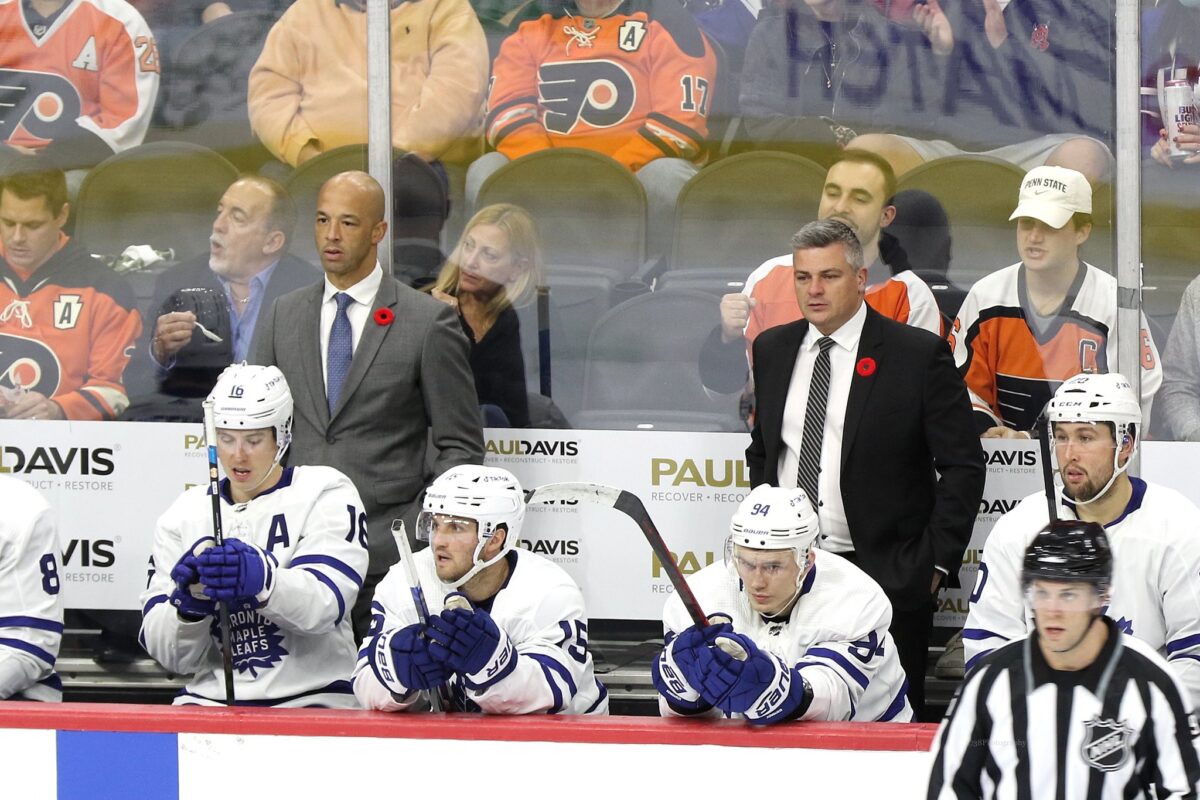Despite having one of the best seasons in franchise history thus far, the Maple Leafs have seen their fair share of ups and downs in 2021-22. They currently have a record of 32-14-4, which is great, but they’re also sitting third place in the Atlantic Division behind the Florida Panthers and Tampa Bay Lightning, and have played some of their worst hockey of the season of late.
Related: Maple Leafs Daily Download
They’ve lost five of their last seven games, including a three-game losing streak for the first time since October. Much of their struggles can be attributed to two things; a collective slump between goaltenders Jack Campbell and Petr Mrazek, and old habits such as taking their foot off the gas and not starting games on time starting to creep back in.

However, one area of their game that has been glaringly better not only in recent games, but for the entire season, is their special teams. The Maple Leafs’ power play percentage (PP%) currently sits atop the league by a wide margin at 30.4%. Meanwhile, their penalty kill percentage (PK%) sits sixth in the league at 84.3%. They’ve seen a massive improvement on both fronts, as their power play finished 16th in the league at 20.0% and their penalty kill 24th in the league at 78.5%.
The Maple Leafs made a couple of crucial hires in the offseason, where lots of their special teams success can be traced back to. With that, I decided it would be fun to take a look at why the Leafs’ power play and penalty kill have been so much better in 2021-22.
Maple Leafs’ Power Play is More Unpredictable
The Maple Leafs’ power play to start the 2020-21 season was unstoppable. They loaded up their top unit with Auston Matthews, Mitch Marner, William Nylander, and John Tavares, and as you would expect, it did some serious damage. Their PP% was ranked first in the league at a whopping 43.3% for the first month of the season, and then it seemingly fell off a cliff. They fell from first in January, to ninth-best in February, then all the way down to 27th-best in March.
The Maple Leafs’ power play coach in 2020-21 was Manny Malhotra. And all due respect to Manny, having him running the power play never made sense from the start. As a player, he was notoriously a defensive-minded centre who specialized in penalty killing and faceoffs, so having him coach the power play and relying on him to get the most out of the Maple Leafs’ top offensive players was like trying to fit a square peg in a round hole.

Malhotra is still on the Maple Leafs’ coaching staff, but power play duties have been handed over to Spencer Carbery, who led the American Hockey League’s (AHL) Hershey Bears to a MacGregor Kilpatrick Trophy in 2020-21, awarded to the AHL’s top team. With no Calder Cup playoffs in 2020-21 due to COVID-19, this was the next best achievement Carbery could meet. On top of this, he was named AHL coach of the year in 2020-21.
Fast forward to 2021-22 in his role with the Maple Leafs, and the team’s power play is once again where it should be. For me, the difference maker has been their willingness to experiment with different plays on the power play and keep the penalty killers on their toes. More often than not, the power play last season would have been some variation of this – Tavares wins the draw to Morgan Rielly, Rielly passes it to Marner, Marner attempts the slap-pass across the ice to find either Matthews or Tavares in front, defenseman retrieves the puck and clears it.
This year, the Maple Leafs’ power play is much more mobile, and it’s seldom you see the players remain in the same place for the entire two minutes with the man advantage. A good example of this is in the video above. You see Marner starting the shift on the left half wall, and once Tavares gains possession of the puck behind the net, he creeps into net front territory where Nylander finds him for what would be his first power play goal in 100 games.
The Maple Leafs have gone 5-for-14 since February 10, which, despite, only winning two of their last seven games, is good enough for fourth in the league on the power play. I know this is a pretty small sample size, but it goes to show that keeping their game plan fresh and not allowing teams to swarm Matthews and Marner has been working in their favour, even when they’re losing.
Maple Leafs’ Taking Penalty Killing Notes From Hurricanes
The Maple Leafs’ power-play success this season is one thing, but at the same time, this shouldn’t be a surprise. They’re a team built around skill and offense, so a strong power play is to be expected. On the other hand, the success that the penalty kill has seen in 2021-22 is nothing short of a pleasant surprise, and much like the power play, part of its success can be attributed to an offseason hire.
Related: NHL Roster Report: Sabres, Flyers, Maple Leafs & More
The Maple Leafs had now-Seattle Kraken head coach Dave Hakstol running their penalty kill in 2020-21, and the results weren’t pretty. Under Hakstol, the their penalty kill was 21st in the league in 2019-20, and 24th in 2020-21. To me, the Hakstol hiring never made sense. He hadn’t seen much success as head coach of the Philadelphia Flyers, losing in the first round in two of his three full seasons as head coach, and missing the playoffs in the other. So, what do you do when you need improvement in a specific area of your game? You hire somebody who’s an expert in said area. And in this case, that expert was Dean Chynoweth.
Chynoweth was named an assistant coach of the Carolina Hurricanes prior to the 2018-19 season. He took the Hurricanes’ penalty kill from 24th-best in 2017-18 to eighth-best in his first season with the team. They only improved from there, finishing with the fourth-best PK% in 2019-20 and the third-best PK% in 2020-21. The Hurricanes are one of the strongest defensive teams in the league, and much of their success can be credited to Chynoweth.
Fast forward to 2021-22, and Chynoweth has already had a similar effect on the Maple Leafs. He’s brought their penalty kill from 24th-best in the league to sixth-best thus far, and they already have seven shorthanded goals on the season compared to only three in 2020-21. That’s good for a three-way tie for second in the league and only one behind the league-leading Vegas Golden Knights, who have eight.
The biggest reason the Maple Leafs have seen such an improvement on the penalty kill is their aggressiveness. The standard way to defend on a penalty kill is to have your two defenders pressuring the players down low while the two forwards guard the point. Instead, the Maple Leafs have been swarming whoever has the puck, which in turn forces the opponent to make snap decisions with the puck, often resulting in turnovers or missed passes.
This is the style of penalty killing that made the Hurricanes one of the hardest teams to go up against on the man-advantage. And while the Maple Leafs don’t have a back end loaded with defensive stalwarts like Jaccob Slavin, Brett Pesce, and Ian Cole, the effects are already starting to show up in a big way.
The video above perfectly captures the Maple Leafs’ newfound aggressiveness. David Kampf (who has been an excellent addition himself) swarms Kris Letang and forces him to turn the puck over to Rielly, who then sets him up for what was his second shorthanded goal in as many games. It’s a style that’s clearly working for them, and one wonders where they would be right now without their new style of killing penalties.
Special Teams Will Be Crucial Come Playoffs
Too many times in the past have we talked about how if the Leafs had converted on this power play, or had they not taken that penalty that led to that power play goal against, things may have been different. The Maple Leafs already have a whirlwind of expectations circling them come playoff time, and one area they can control their own destiny in is on their special teams.
You may also like:
- Maple Leafs Won’t Go Far with Samsonov in Net
- Maple Leafs News & Rumors: Marchand, Domi, Samsonov & Nylander
- Maple Leafs in 2-1 Hole to Bruins After Game 3 Loss
- Maple Leafs Test William Nylander for Concussion Concern
- Prime Video to Carry National Monday Night Games in Canada
The penalty kill wasn’t that much of an issue in last year’s playoffs, as they had the third-best PK% in the first round. However, it helped that they were playing a low-scoring team in the Montreal Canadiens, and if they find themselves going up against the Panthers or the Lightning this year, they’re going to need their penalty kill to be strong.
You May Also Like
- Maple Leafs News & Rumors: Amirov, Matthews, Muzzin & Miller
- Maple Leafs Could Make Big Trade With Canucks If Muzzin Lands on LTIR
- Canucks Need Maple Leafs Prospect Niemelä Included in Any Miller Trade
- Maple Leafs Passed on Klingberg Trade – NHL Insider
Meanwhile, the power play couldn’t have been much worse for them in that first round against Montreal. They had the second-worst PP% in the league during that first round, far from a surprise considering how snakebitten the entire team was. And if the Maple Leafs want to make any noise in the playoffs this year, they need to embrace their identity as an offensively-built team and make their power play their most lethal weapon. And if they keep doing what they’re doing, they’ll have taken at least one step in the right direction.